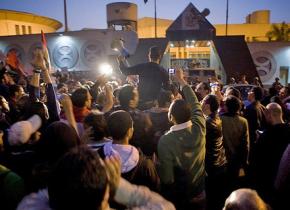Making the revolution permanent
A month after the fall of dictator Hosni Mubarak, the massive movement that showed its power by overthrowing him faces new challenges, as the ruling class and its imperialist allies attempt to save the system that Mubarak presided over. , a member of Egypt's Revolutionary Socialists, writes on the struggle ahead for the organization's newspaper.
IN 18 days, the Egyptian people toppled a longtime tyrant, but 30 years of corruption and despotism cannot be erased in only 18 days of the revolution. Corruption is pervasive in the system, from its torso to its limbs, and tyranny was at the heart of every policy that was implemented. Therefore, the ousting of Mubarak can only be a prelude to the overthrow of a regime that retains all its symbols and its policies.
The Mubarak dictatorship was only part of a dictatorship of an entire system--Mubarak was only its head. This system is still able to implement policies that impoverish the mass of people, policies of privatization, and policies that continue the alliance with the Zionist entity and serve American interests--even without a dictatorship that sheltered the architects of those policies from the wrath of the masses.
Therefore, the struggle to end this dictatorship and the special laws it was based on cannot be completed without the struggle against the causes that led to political repression and tyranny in the first place.

At the same time, millions of Egyptian revolutionaries did not come out in the streets and in the workplace only to remove a tyrant or win a handful of democratic demands that have not even been implemented yet. In the end, the millions who live below the poverty line cannot return to their homes after the revolution to feed their children with "freedom" and "democracy." Indeed, poverty, inflation and unemployment were the main reasons that prompted Egyptians in this revolution.
The government media--and also the independent media--today promote the false idea that the revolution had ended by ousting Mubarak. These same media were attacking the revolution before the overthrow of the dictator, and they called on the rebels to return to their homes. Today, they play the same role and call for the same workers, students and others to refrain from strikes and sit-ins.
But if we do not continue the revolution to make radical changes in the economic structure and the distribution of social wealth--in other words, if we do not extend the revolution to demand not only democratic rights, but also economic and social rights, dictatorship will reassert itself in different forms. It will be as if we toppled Mubarak only to face 100,000 Mubarak singing the praises of revolution, democracy and reform, but continuing policies of tyranny and impoverishment.
We cannot forget that the revolution in Egypt is not an isolated island, but part of a wave of revolutions that swept the Arab region. These revolutions, if they succeed and continue, will certainly support us, as was the case between the Tunisian and Egyptian revolutions. The Tunisian revolution inspired the Egyptian one. In turn, the Egyptian revolution gave the people in Libya, Yemen, Algeria and Bahrain confidence in themselves and in their ability to make their own revolution for change.
The continuation of the revolt against the symbols of corruption, against the policies of that cause impoverishment and against the policies of dependency is the only guarantee of preserving the gains of the revolution that were accomplished by the mass struggle, and to win more gains. The continuing revolution in the Arab region against dictatorial regimes is what will protect the Egyptian revolution and push us forward.
Let the revolution in Egypt's permanent! Let our revolution in the Arab region be permanent! Let there be a permanent revolution in the factories and neighborhoods and universities until we achieve all our demands!
Translated by Mostafa Omar


